- Home
- Roger Smith
Nowhere Page 7
Nowhere Read online
Page 7
Dankie, pappie.
Dankie.
The news of her father’s arrest had reached her the evening before as she’d driven her battered yellow Nissan Sentra through the dusk towards Observatory, Cape Town’s student quarter, the radio gabbling mindlessly about the murder of the president’s wife, which she’d paid little attention to.
But she had paid attention to the terse announcement that her father had been arrested for the murder of a black man in the town of Nêrens in the faraway Kalahari. It had got her firing up a cigarette and sucking on it, her nerves twanging, her thoughts scattered in the Southeaster that blew in off the ocean.
She’d had to do a breathing exercise to get herself under control.
When she’d arrived at the small gallery where she was appearing as part of a series of performance art events, the owner, Tjaart de Wet, shaven-haired, pierced, tattooed and gay, was waiting for her at the door
“So, have you heard about the arrest?” he said in English, although they were both Afrikaners.
“Yes,” she said, brushing past him, crossing the empty gallery toward the kitchen-cum-dressing room.
“I’ve been on Facebook and Twitter and spoken to UCT campus radio and had one helluva response.”
“Oh, great, so we can expect a bunch of beery little turds pitching up to see Magnus Kruger’s daughter kaalgat?”
Bare-assed.
“Don’t be a bitch, Sue. I’ve bumped you up to near the top of the order.”
They entered the cramped room and she dropped her bag on the table. What went unspoken was that she was usually among the last acts, when the few diehards who’d shown up were bored and tired and had disappeared in search of booze and food and sex. For Sue Kruger was no drawcard, her performances getting little acknowledgement and scant respect, the few critics who bothered to review her efforts calling their Boer-baiting dated and irrelevant, a curiosity at best.
It was only out of friendship that Tjaart still threw the occasional gig her way.
Or pity, more like it.
So it had made a change—no matter what had prompted it—to stand in the dark, waiting to go on, hearing the avid babble of an honest-to-god crowd silenced by the mournful dirge swelling out of the sound system followed by Sue’s recorded voice speaking English with a heavy, quivering Afrikaans accent—very different from her own voice, long free of the glottal stops of her mother tongue—intoning that it was the bitter winter of 1843, and that the snow lay heavy on the mountains and plains of the Orange Free State across which the brave Boers dragged their ox-wagons, fleeing the English in the Cape for the hinterland and freedom. Intoning how twelve-year-old Racheltjie de Beer and her five-year-old brother, Trompie, went looking for a lost calf and were separated from their parents, lost in the dark of the blizzard.
This was her cue and Sue stepped out into the blue light that flickered against a projected snowscape.
The small gallery was packed with people spilling out into the summer night.
The wind machine clutched at the folds of the long Voortrekker dress (taffeta, a tight bodice and a wide, floor length skirt) she wore, and threatened to tear off her bonnet. She carried with her the big doll that doubled for the little brother.
Polystyrene snow swirled and the wind moaned on the effects track as Racheltjie collapsed to the ground, holding her brother to her bosom.
A clumsily operated spotlight—come on, Tjaart, get your fuckin shit together—finally found a papier-mâché anthill and Racheltjie fought her way across to it, dragging her brother with her. She cleared fake snow from the mouth of the ant heap and forced her brother inside.
Sue stood and removed her bonnet, unleashing the wild flaxen hair that hung to her waist, and loosened the stays of her dress and pulled it over her head, stuffing it into the mouth of the ant heap. Shedding her petticoat and bloomers, she added them to the pile of insulation.
Then, standing stark naked in the blue light and the wind, she called, in a child-like voice, upon god, their god, their Boer god, the god of the chosen people to save her and her brother and she sank down in front of the hole and covered it with her body, the blizzard blowing in and the lights dimming.
The lights came back on, warm light, simulating dawn and Tjaart (reluctantly press-ganged into this) dressed in the neo-fascist uniform of her father and his idiots, marched in from the side, his fake shovel beard thrust forward, and dragged the lifeless body of Racheltjie from the hole, reaching in and pulling out a child-sized golliwog, which he dropped in horror.
Darkness.
When the lights faded up Tjaart and the golliwog were gone, the naked Sue alone before the audience.
She stood and faced them, at ease in her nakedness. She had done this countless times before. And, for what it was worth, she was beautiful, with her mother’s long limbs and high breasts. Despite all the abuse she had heaped upon this body in her thirty-three years it had held firm, radiated light and beauty—acted as a lure for countless men she no longer wanted.
Speaking in her own voice, that of the educated English-speaking South African, she told of how every white child in South Africa had grown up believing the story of the heroic Racheltjie was true.
But it was a lie.
Racheltjie de Beer had never existed. Her story had been stolen from that of a real American heroine, Hazel Miner, who, at the turn of the twentieth century, had saved her siblings’ lives at the cost of her own in North Dakota.
But still, the fake Racheltjie adorned the monopoly money of a grubby little volkstaat up in the Kalahari. The money, used as vouchers in Witsand, fluttered from the rafters of the gallery, the audience fighting for them as keepsakes.
“Goodbye Racheltjie,” Sue Kruger said. “We miss you already.”
Then she walked off to uncertain applause, through to the dressing room. The performance pieces would continue, she was just one of many artists, but she doubted the audience would stay.
Tjaart was waiting for her backstage.
“So, how about that?” he said.
“Yeah, how about it? A room full of pervs shooting pics of my twat on their iPhones.”
“Jesus, Sue, a little fuckin gratitude.”
“Sorry.” She pulled on a T-shirt, her face appearing through the hole wearing a fake simper. “Thank you. Thank you, Tjaart. Thank you for everything.”
“And there’s a TV crew here,” he said, “from the Netherlands.”
“Really?”
“Ja. They want to interview you.”
“Do they now? Let me guess. It won’t be about Racheltjie, will it?”
“Does it matter?”
“Yes,” Sue said lighting a cigarette and puffing at it furiously, squinting in the mirror as she tied her hair back into an untidy ponytail. “To me it matters.”
“But you’ll talk to them?”
She shook her head. “No. I’m hitting the road.”
“Just talk to them for five minutes. Then you can go home.”
“I’m not going home?”
“Where are you going?”
In reply she sang, in her very good, pure, voice, “Ver in die ou Kalahari, daar sing die Boere so . . .”
Far away in the old Kalahari the Boers are singing . . .
“You’re not going to Nêrens?” Tjaart said.
“Oh yes I am.”
“Seriously? That’s over a thousand klicks away.”
“I know. That’s why I’m leaving now.”
“Jy’s mal, Sue.”
You’re crazy.
“So they keep telling me.” She was packing her Voortrekker dress into a bag.
“You’re mad to go up there. When last did you see him, anyway?”
“Nine years, three months, six weeks and four days, give or take.” She’d looked at her friend. “I think it’s time, Tjaart. It’s time for me to see my darling old daddy.”
So she’d come up here and wielded her selfie stick and confronted her father, getting a response mo
re gratifying than she could have ever imagined.
Sitting at the table of the Wimpy beneath the NO BREASTFEEDING sign (she’d already posted a photograph of it to Twitter and Instagram) she checked her YouTube channel on her Samsung and saw that the video she’d shot of the ambush of her father and uploaded even as the ambulance was ferrying him to the clinic (his acolytes hissing and swearing at her in Afrikaans) already boasted over twenty-thousand views, and her phone was jammed with messages from the media.
Sue Kruger’s fifteen minutes of fame were here.
Dankie Pappie.
SEVENTEEN
Joe Louw stood in the garden of the president’s official residence staring up at the fire on the mountain. The hot dry wind fanned the flames on Devils Peak and a Sikorsky helicopter came in low and water bombed the fire and then clattered away to recharge its suspended bucket.
It was hot as bloody hell and Louw, sweating in his suit, found the shade of a milkwood tree, misshapen and bent by years of wind, and yanked at his shirt collar, as tight as a garrote. His hand, on a mission of its own, fumbled for the pack of Camels in his pocket and he cursed and fished for a Nicorette and stood sucking the thing as he watched the blaze.
He’d been a cop for over thirty years.
A good cop.
A clean cop.
His career had begun in Apartheid South Africa, when Afrikaner policemen had had free reign with gun and baton and boot, but he’d succumbed to none of the racist thuggery of his brother officers, and later, too, under the new dispensation when the police behaved like bandits, looting, raping, pillaging, he’d stood apart, building his reputation as a solid, reliable, honest detective.
And now, in the space of a day, he had reduced all those years to nothing.
The morning had been torture for him.
Under the watchful eye of Steve Bungu he’d questioned the president’s bodyguards in an office of the residence, sitting in impotent silence as they trotted out the lines that Bungu had scripted for them, the chunky black man crouched at his side like a proud playwright.
When the bodyguards had been released Bungu had led Louw into Genadendal’s dining room to view the murder scene. The rug and the spear had been removed for forensic inspection, and there was nothing to see.
“Do I get to speak to the president?” Louw had asked.
Bungu had stared at him from under his craggy brow. “What the fuck for?”
“I thought I had to interview everybody?”
“Jesus, Louw,” Bungu had said, speaking softly, standing close enough for Louw to get the full benefit of whatever vile township food he’d swallowed for breakfast, “he’s the fuckin president. He’s got more important things to do than see you. We’ll say you saw him. Okay?” Louw had stared at him. “This is just showbiz man, fuckin remember that.”
Bungu’s cell phone had rung and Louw’d taken the opportunity to step out through the French doors into the garden, to get some air and to compose himself.
“Meneer.” A hissed whisper.
He looked around and saw a mixed-race woman in the pinafore of a kitchen worker beckoning him from behind a bush of Cape honeysuckle.
Louw glanced back toward the mansion, saw nobody watching him and stepped around the shrub to where the woman stood, puffing on a cigarette, cupping it in her hand like a convict in a prison yard.
She was in her late fifties, very thin, and clearly agitated, speaking in the rapid Afrikaans of the Cape Flats.
“Meneer, I’m glad you’re here. I don’t trust them.” She jerked a head toward the house.
“Who?”
“The blacks.”
Louw said nothing, confronting one of the many facets of South African racism, which wasn’t—contrary to the belief of outsiders—a black and white affair. All colors, and all shades of skin, seemed to be caught up in a complex and never ending dance of mutual dislike and suspicion.
Back in the Apartheid days the mixed-race people, the coloreds, had been thrown a few crumbs. They could ride on the white busses (if they sat at the rear) and they’d been given some housing privileges. These sops had left them feeling at once inferior to the whites and superior to the blacks.
An attitude that still prevailed among many of this woman’s generation.
“I saw something,” she said. “That night.”
Louw wanted to tell her to shut up and turn away and get himself very far from this woman and whatever she had to tell him, but he sighed and he said, “What’s your name, mevrou.”
“Mercia Booysen, meneer. I work in the kitchen.”
“I can see that,” he said.
“I have worked here since Mr. Botha was president.”
“That’s a long time.”
“Thirty-five years,” she said.
“What did you see?” Louw asked.
She waved the cigarette in her hand. “I can’t smoke in the house,” she said, “so Tuesday night I left the kitchen. We’d finished the dinner for the president,” she pulled a face, “goat meat and pap. He eats like a savage. I was washing up and wanted a quick smoke, so I went out and I was here in the garden and I looked through the window.”
“Yes?”
“It was terrible, meneer.”
“What?”
“He, the president, was shouting at his wife and then he took that spear off the wall and he stabbed her with it and she fell. I just ran back inside. I was shaking. I got my bag and I left, quick as I could, got myself home to Paradise Park.”
“Did you say anything to your friends in the kitchen?”
“No. Not a blessed word. I was too scared.”
“And your family?”
“My husband is long gone, god rest his soul, and my son . . . Well, the less I speak of him the better.” She sniffed. “No, I’ve said nothing. And I wasn’t going to say nothing to nobody. Keep your mouth shut, Mercia Booysen, I told myself. What they do to one another is their problem, not yours.” She dropped her cigarette and ground it dead beneath her low heel, stooped and retrieved the butt and wrapped it in a Kleenex before putting it in the pocket of her pinafore. “Then I saw on the TV that you were in charge. I remember you from the station killer case.”
A decade ago a man had abducted boy children from train stations and raped and killed them. Because they were colored kids there hadn’t been a sense of urgency to solve the murders, the police refusing to acknowledge that a serial killer was at work.
Louw had asked for the case and it had taken him six months, following a tragic trail of small, broken bodies before he’d nailed the bastard. A lay preacher from one of the middle-class colored areas.
“That was a good thing that you done, meneer,” she said.
“Thank you,” he said, feeling very far from the man he’d been back then.
“Will I get into trouble, for telling you this?”
“No,” he said, lying through his nicotine-stained teeth. “No, you’ve done the right thing. But you must promise me something.”
“Anything, meneer.”
“You don’t breathe a word about this to anybody else. Not friends, not family and especially not to the media.”
“I wouldn’t talk to those vultures, meneer. Never.”
“They would pay money for this. A lot of money.”
She drew herself up to her full height. “I don’t need their filthy money.”
“Good. Thank you Mevrou Booysen. I know where to find you. You leave this with me.”
“Thank you, meneer. Thank you.”
She slipped away, back to the house, with her cigarette butt and her secret.
As he crossed the wide lawn to where Bungu stood on the terrace watching him Louw convinced himself that he would say nothing of this to the squat black man.
But when Bungu said, “Where were you, Joe?” Louw stepped in close and spoke under his breath: “You’ve got a problem. A big fuckin problem.”
EIGHTEEN
When Disaster Zondi had seen Magnus Kruger
drop like a sack of shit to the stone steps of the courthouse, he’d felt a surge of relief.
The fucker was dead.
It was over.
Zondi had been relieved of this self-imposed burden and he could go home and let the next chapter of his dreary life, a life of privation and lowered expectations, unfold.
But Kruger had survived and the charade continued.
By the time the Boer had been ferried away by the EMT crew the bizarre apparition in the Voortrekker garb had disappeared.
But you couldn’t get far dressed like that and when Zondi had questioned a couple of black bystanders he’d been directed to the greasy spoon on the main drag, and as he stood on the sidewalk looking in at the blonde woman—almost unrecognizable now in her jeans and T-shirt—sitting alone at a table, he was six years old, back in KwaZulu, staring in through the window of the Wimpy in the town closest to his parents’ mud hut, the diner’s burgers, ice creams and tacky décor a vision of heaven to him.
He’d been unable to get any farther than the sidewalk, the Wimpy verboten territory because of the color of his skin. But even if he’d been allowed in, his mother—bringing him to town with her once a month to buy skim milk and mielie meal—wouldn’t have been able to afford the junk food.
Zondi shook off the flashback and went inside.
The staff watched him suspiciously: black men dressed in expensive suits weren’t common coin up here. He ignored them and walked across Susanna Kruger’s table.
When she looked up at him her tragic beauty still had the power to stir something in him that he’d thought long dead.
“Ms. Kruger?”
“If you’re media, I’m not ready to talk,” she said.
He flipped open his ID. “Disaster Zondi. I’m investigating your father.”
“Okay.”
“Mind if I sit?”
She shrugged. “Sure.”
He took a seat opposite her.
“Don’t order the coffee,” she said, “it tastes like donkey piss.”

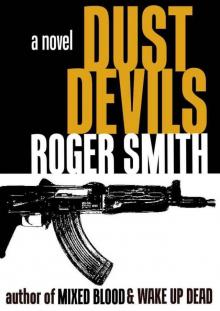 Dust Devils
Dust Devils![[2013] Sacrifices Read online](http://i1.bookreadfree.com/i/03/19/2013_sacrifices_preview.jpg) [2013] Sacrifices
[2013] Sacrifices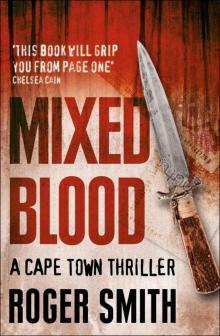 Mixed Blood
Mixed Blood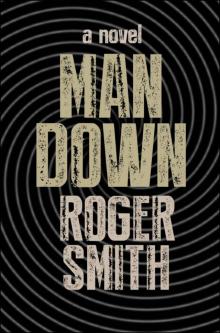 Man Down
Man Down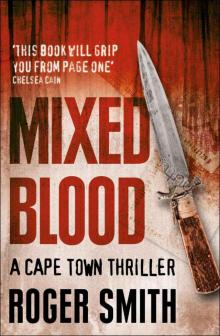 Mixed Blood ct-1
Mixed Blood ct-1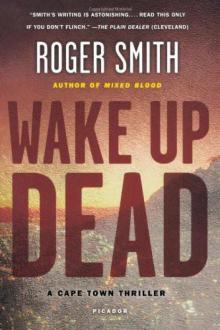 Wake Up Dead: A Thriller (Cape Town Thrillers)
Wake Up Dead: A Thriller (Cape Town Thrillers)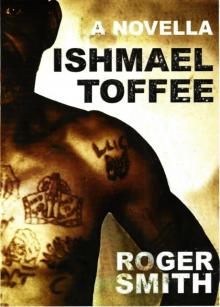 Ishmael Toffee
Ishmael Toffee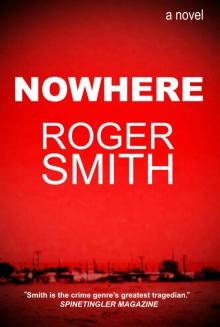 Nowhere
Nowhere Sacrifices
Sacrifices